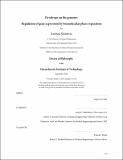Dewdrops on the genome : regulation of gene expression by biomolecular phase separation
Author(s)
Shrinivas, Krishna,Ph. D.Massachusetts Institute of Technology.
Download1241096021-MIT.pdf (86.05Mb)
Alternative title
Regulation of gene expression by biomolecular phase separation
Other Contributors
Massachusetts Institute of Technology. Department of Chemical Engineering.
Advisor
Arup K. Chakraborty.
Terms of use
Metadata
Show full item recordAbstract
Human development and physiology depend on the coordinated function of thousands of cell types - for example, neurons, immune cells, and skin cells. Each cell-type contains an identical copy of the genetic material yet performs specialized and diverse functions, in large part, due to the selective expression of particular coding DNA-elements (genes) into RNA. Mutations or dysregulation in control of gene expression underlie many diseased states, including cancer and neurodegenerative disorders. Non-coding DNA elements called enhancers orchestrate the complex biochemical pathways that lead to precise activation of cell-type specific genes. Decades of advances in molecular biology have identified many of the key proteins and their interactions in these pathways. Yet, how dozens of proteins and their complex network of interactions are organized in space and time by enhancers to robustly relay regulatory information to their target genes remains one of the central puzzles of transcriptional control. In this thesis, I will leverage approaches from statistical physics, simulation, and informatics, in synergy with experimentalists, to gain mechanistic insights into gene control through the lens of biomolecular phase transitions. Proposal: I will introduce recent evidence that proteins and nucleic acids with certain features phase separate into two liquid phases, like oil from water, to compartmentalize cellular pathways. Employing a simple physical model, I will propose the phase separation of the transcriptional machinery explains established and recently observed puzzles underlying a class of enhancer elements called super-enhancers. Subsequently, I will describe studies performed in collaboration with the Young and Sharp labs that provide direct experimental evidence of transcriptional condensates model in vivo. Mechanism: I then will describe our efforts to identify the mechanisms contributing to the formation of transcriptional condensates. By combining molecular dynamics, informatics, and experimental assays, we identify specific features encoded in DNA that enable spatio-temporally localized formation of condensates. I will discuss implications on the origins of enhancer activity. Control: Here, we'll combine non-equilibrium models of phase separation, coacervate chemistry, and imaging data in cells to explore the dynamic control of transcription through it eventual outcome i.e. ATP-dependent synthesis of RNA. We propose a dual-feedback mechanism in which low levels of RNA synthesis promote condensate formation and higher levels trigger dissolution. I will close by discussing the ramifications of our model on two enigmatic features of transcription - the pervasive synthesis and degradation of non-coding RNA and discrete and bursty dynamics of mRNA synthesis. I will conclude with a short summary and brief discussion on future work.
Description
Thesis: Ph. D., Massachusetts Institute of Technology, Department of Chemical Engineering, September, 2020 Cataloged from student-submitted PDF of thesis. Includes bibliographical references.
Date issued
2020Department
Massachusetts Institute of Technology. Department of Chemical EngineeringPublisher
Massachusetts Institute of Technology
Keywords
Chemical Engineering.